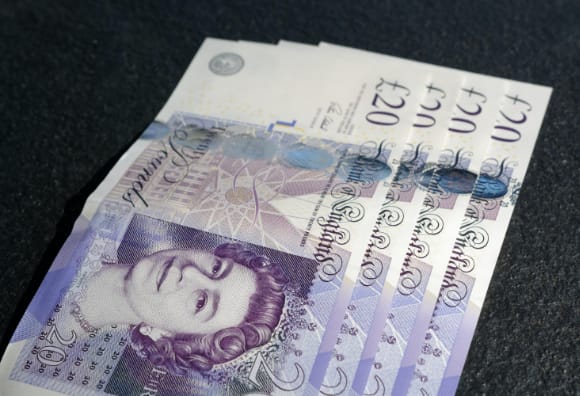How much will I earn on a Higher Apprenticeship?
- Jack Collins
- Last updated 09 Apr 2020
So you want to be a Higher Apprentice? You want to gain an incredible amount of experience in your industry of choice, you want a fantastic qualification that will help you kick-start your career, but also, perhaps most importantly, you want to get paid. Ideally, as much as possible! But how much will you earn as a Higher Apprentice? Great question. Let’s find out...

What’s the lowest wage I’ll earn as a Higher Apprentice?
First things first: if you do a Higher Apprenticeship, you will definitely, 100% get paid.
Apprentices, like all other workers in the UK, are protected by the government to ensure you are paid a fair wage. You’ve probably heard of the National Minimum Wage before. This ensures that any employer must pay you at least a certain amount of money per hour.
It’s important to note here that the National Minimum Wage is actually currently lower for apprentices than it is for non-apprentices.
If you are an apprentice under the age of 19, the minimum amount you must be paid is £4.15 an hour.
Also, even if you are over the age of 19, and still in the first year of your apprenticeship, you will also be entitled to the same rate of £4.15 an hour.
Good news, though! Once you turn 19 and have finished the first year of your apprenticeship, you will be entitled to the full National Minimum Wage. That’s right! You won’t be on the apprentice rate anymore.
The amount you’ll be paid, though, will depend on your age. Here’s the breakdown:
- If you are aged 19 or 20, you will be paid at least £6.45 an hour.
- If you are aged 21, 22, 23 or 24, you will be paid at least £8.20 an hour.
- If you are aged 25 and over, you will be paid at least £8.72 an hour.
While some employers will pay their apprentices the National Minimum Wage, many employers will pay significantly more than this!
The top companies competing for the top talent will often offer far higher salaries!
If you are an apprentice under the age of 19, the minimum amount you must be paid is £4.15 an hour.
What’s the average salary for a Higher Apprentice?
According to Glassdoor, the average base pay for a Higher Apprentice in the UK is £17,649, which certainly matches up with the kind of salaries you’ll regularly see on the apprenticeship job listings on AllAboutSchoolLeavers.
What’s the highest wage I could earn?
Some Higher Apprentice salaries go up to around £25,000 per annum. Right now, on our list of live Higher Apprenticeship job opportunities, you’ll certainly see jobs with salaries upwards of £21,500.
What’s more, you can earn these higher salaries in all kinds of industries, from law, banking and accountancy to engineering and technology.
I’ve never earned an annual salary before. How does this convert into a monthly, weekly or hourly wage?
This is hugely important to consider! Sure, that annual salary sounds great, but how much dosh will you actually have to live off?
Here’s an example:
If you earn a salary as a Higher Apprentice of £21,000 per annum, and you work a standard 40-hour working week, i.e. 8 hours day, 5 days a week, this is how it breaks down:
- Monthly wage: £1,750
- Weekly wage: £403.85
- Daily wage: £80.77
- Hourly wage: £10.10
Got it? Good.
Will I be paid if I take a holiday?
Again, the government has got your back here! Almost all workers in the UK who work 5-days a week are entitled to at least 28 days of paid annual leave a year.
This equates to 5.6 weeks of sweet, sweet paid holiday. Boom!
Please note: employers can include your 8 bank holidays in this 28-day allowance, so effectively you’ll be getting 20 days of paid holiday on top of your bank holidays. Not bad, eh?
Don’t worry! If you work fewer than 5-days a week, you’ll still be entitled to a statutory amount of holiday. This will just be worked out proportionally (a.k.a. pro-rata).
Many employers will also offer an even more generous holiday allowance than this to help them attract and retain quality staff. A happy worker is a productive worker, after all!
Will I pay tax?
Yes, you will. As an apprentice, you are not exempt from tax laws. You are an employee too and you’ll be treated the same way as every other employee in the UK when it comes to taxes.
You’ll pay income tax and a National Insurance Contribution each month. Normally, this will be taken out of your monthly salary automatically through the Pay As You Earn (PAYE) system.
The basic tax rate for salaries up to £50,000 is 20%.
One silver lining, though, is that you aren’t required to pay tax on £12,500 of your salary. This is your personal tax-free allowance. So if you earn £21,000, you will only be taxed on £8,500 of your annual salary.
More articles like this
- Law apprenticeships: Higher Apprenticeships
- Higher Apprenticeships: options
- Higher apprenticeships: who can do one?
- Retail management Higher Apprenticeships
- What Skills Do Higher Apprenticeships Develop?
- Higher Apprenticeships
- How hard is it to get a Higher Apprenticeship?
- FE college vs. Higher Apprenticeships
- PR apprenticeships: Higher Apprenticeships
- Business apprenticeships: Higher Apprenticeships